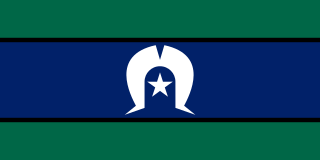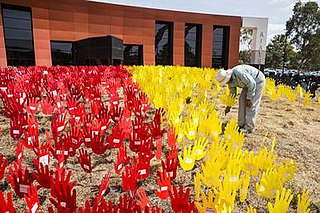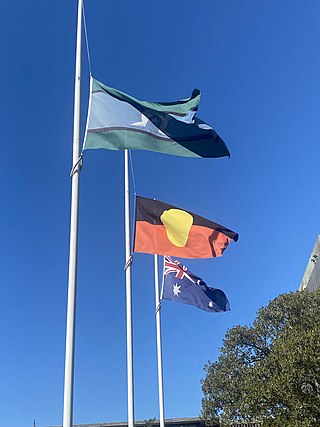
The Torres Strait Islands are an archipelago of at least 274 small islands in the Torres Strait, a waterway separating far northern continental Australia's Cape York Peninsula and the island of New Guinea. They span an area of 48,000 km2 (19,000 sq mi), but their total land area is 566 km2 (219 sq mi).

The Aboriginal and Torres Strait Islander Commission (ATSIC) (1990–2005) was the Australian Government body through which Aboriginal Australians and Torres Strait Islanders were formally involved in the processes of government affecting their lives, established under the Hawke government in 1990. A number of Indigenous programs and organisations fell under the overall umbrella of ATSIC.
The Central Australian Aboriginal Media Association (CAAMA) is an organisation founded in 1980 to expose Aboriginal music and culture to the rest of Australia. It started with 8KIN-FM, the first Aboriginal radio station in the country. Based in Alice Springs, the organisation is particularly focused on the involvement of the local Indigenous community in its production. CAAMA is involved in radio, television and recorded music.
The Community Broadcasting Association of Australia (CBAA) is the peak body and the national representative organisation for community radio and television stations in Australia. The CBAA provide leadership, advocacy and support for members to actively provide independent broadcasting services and to build and strengthen local communities. The organisation provides advice and support to community broadcasters regarding a variety of issues.
Imparja Television (IMP) is an independent Australian television station servicing over 3,600,000 km2 (1,400,000 sq mi), across six states and territories: Northern Territory, South Australia, Queensland, New South Wales, Victoria and Tasmania. It is based in Alice Springs, and is controlled by Aboriginal people through ownership by Imparja Television Pty Ltd.
Vibe Australia is an Aboriginal media, communications and events management agency founded by Gavin Jones in 1993. Located in Darlinghurst, Sydney, New South Wales, they work with Aboriginal and Torres Strait Islander people throughout Australia.

The Australian Institute of Aboriginal and Torres Strait Islander Studies (AIATSIS), established as the Australian Institute of Aboriginal Studies (AIAS) in 1964, is an independent Australian Government statutory authority. It is a collecting, publishing and research institute and is considered to be Australia's premier resource for information about the cultures and societies of Aboriginal and Torres Strait Islander peoples. The institute is a leader in ethical research and the handling of culturally sensitive material and holds in its collections many unique and irreplaceable items of cultural, historical and spiritual significance. The collection at AIATSIS has been built through over 50 years of research and engagement with Aboriginal and Torres Strait Islander communities and is now a source of language and culture revitalisation, native title research and family and community history. AIATSIS is located on Acton Peninsula in Canberra, Australian Capital Territory.
The Deadly Awards, commonly known simply as The Deadlys, was an annual celebration of Australian Aboriginal and Torres Strait Islander achievement in music, sport, entertainment and community. The event was held from 1995 to 2013.

Henry Gibson Dan, known as Seaman Dan, was an award-winning Torres Strait Islander singer-songwriter with a national and international reputation. His first recording, an album called Follow the Sun, was released in 2000, on his 70th birthday.

The Australian National Aboriginal and Torres Strait Islander Education Policy (AEP) is a national policy adopted by the Government of Australia by each State and Territory government. The policy was first introduced in 1989 and is the foundation of education programs for all Indigenous Australians.

National Indigenous Television (NITV) is an Australian free-to-air television channel that broadcasts programming produced and presented largely by Aboriginal and Torres Strait Islander people. It includes the six-day-a-week NITV News Update, with programming including other news and current affairs programmes, sports coverage, entertainment for children and adults, films and documentaries covering a range of topics. Its primary audience is Indigenous Australians, but many non-Indigenous people tune in to learn more about the history of and issues affecting the country's First Nations peoples.
Indigenous Australians are people with familial heritage from, and membership in, the ethnic groups that lived in areas within the Australian continent before British colonisation. They consist of two distinct groups: the Aboriginal peoples of the Australian mainland and Tasmania, and the Torres Strait Islander peoples from the seas between Queensland and Papua New Guinea. The term Aboriginal and Torres Strait Islander peoples or the person's specific cultural group, is often preferred, though the terms First Nations of Australia, First Peoples of Australia and First Australians are also increasingly common; 812,728 people self-identified as being of Aboriginal and/or Torres Strait Islander origin in the 2021 Australian Census, representing 3.2% of the total population of Australia. Of these Indigenous Australians, 91.4% identified as Aboriginal; 4.2% identified as Torres Strait Islander; while 4.4% identified with both groups. Since 1995, the Australian Aboriginal flag and the Torres Strait Islander flag have been official flags of Australia.
Radio Skid Row is a community radio station based in Marrickville, broadcasting to the Inner West suburbs of Sydney. This includes the former municipalities of Leichhardt and Marrickville, and the existing City of Sydney. Its broadcast signal can be received across much of Sydney, and its audience extends to many communities in Greater Western Sydney and, through online streaming, across the world.
The Community Radio Network (CRN) in Australia is a satellite program feed available to subscribing community radio stations. It was created and is managed by the Community Broadcasting Association of Australia (CBAA). The CRN does not produce the programs that are broadcast on the feed, but acts as a distributor of material supplied by member stations.
Koori Radio, is a community radio station based in Redfern broadcasting to Sydney on a citywide licence. Since the early 1990s it has been part of the Gadigal Information Service (GIS), and is the only radio station in Sydney providing full-time broadcasting to the Aboriginal and Torres Strait Islander community.

The Rural Health Education Foundation was an Australian provider of television-based health education for doctors, pharmacists, nurses and allied health professionals.
The Australian Indigenous HealthInfoNet, formerly National Aboriginal and Torres Strait Islander Health Clearinghouse, is an internet resource that collects, collates, interprets, and presents evidence-derived knowledge on Aboriginal and Torres Strait Islander health in Australia.
The Aboriginal and Torres Strait Islander Voice, also known as the Indigenous Voice to Parliament or the Voice, is a proposed Australian federal advisory body to comprise Aboriginal and Torres Strait Islander people. If approved in an upcoming referendum called by the Albanese Government, the Australian Constitution would prescribe the Voice, which could make representations to the Parliament of Australia and executive government on matters relating to Indigenous Australians. If the referendum vote is successful, the government will then design the specific form of the Voice, which will then be implemented via legislation passed by Parliament.

Reconciliation in Australia is a process which officially began in 1991, focused on the improvement of relations between the Aboriginal and Torres Strait Islander peoples of Australia and the rest of the population. The Council for Aboriginal Reconciliation (CAR), created by the government for a term of ten years, laid the foundations for the process, and created the peak body for implementation of reconciliation as a government policy, Reconciliation Australia, in 2001.
Carbon Creative is an Indigenous-owned creative agency based in Brisbane, Australia. The agency was founded in 2006 and produces creative content "to help close the gap between Indigenous and non-Indigenous people" of Australia, shift perceptions of Indigenous communities that centre around negative stereotypes and economic and social disadvantage, and increase representation of First Nations Australians within Australian society.






